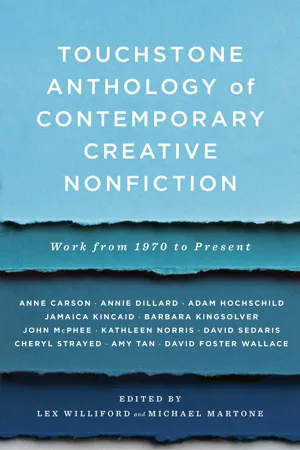
Touchstone Anthology of Contemporary Creative Nonfiction
Work from 1970 to the Present
- 576 pages
- English
- ePUB (mobile friendly)
- Available on iOS & Android
Touchstone Anthology of Contemporary Creative Nonfiction
Work from 1970 to the Present
About this book
From memoir to journalism, personal essays to cultural criticism, this indispensable anthology brings together works from all genres of creative nonfiction, with pieces by fifty contemporary writers including Cheryl Strayed, David Sedaris, Barbara Kingsolver, and more. Selected by five hundred writers, English professors, and creative writing teachers from across the country, this collection includes only the most highly regarded nonfiction work published since 1970.Contributers include: Jo Ann Beard, Wendell Berry, Eula Biss, Mary Clearman Blew, Charles Bowden, Janet Burroway, Kelly Grey Carlisle, Anne Carson, Bernard Cooper, Michael W. Cox, Annie Dillard, Mark Doty, Brian Doyle, Tony Earley, Anthony Farrington, Harrison Candelaria Fletcher, Diane Glancy, Lucy Grealy, William Harrison, Robin Hemley, Adam Hochschild, Jamaica Kincaid, Barbara Kingsolver, Ted Kooser, Sara Levine, E.J. Levy, Phillip Lopate, Barry Lopez, Thomas Lynch, Lee Martin, Rebecca McCLanahan, Erin McGraw, John McPhee, Brenda Miller, Dinty W. Moore, Kathleen Norris, Naomi Shihab Nye, Lia Purpura, Richard Rhodes, Bill Roorbach, David Sedaris, Richard Selzer, Sue William Silverman, Floyd Skloot, Lauren Slater, Cheryl Strayed, Amy Tan, Ryan Van Meter, David Foster Wallace, and Joy Williams.
Frequently asked questions
- Essential is ideal for learners and professionals who enjoy exploring a wide range of subjects. Access the Essential Library with 800,000+ trusted titles and best-sellers across business, personal growth, and the humanities. Includes unlimited reading time and Standard Read Aloud voice.
- Complete: Perfect for advanced learners and researchers needing full, unrestricted access. Unlock 1.4M+ books across hundreds of subjects, including academic and specialized titles. The Complete Plan also includes advanced features like Premium Read Aloud and Research Assistant.
Please note we cannot support devices running on iOS 13 and Android 7 or earlier. Learn more about using the app.
Information
Anne Carson
THE GLASS ESSAY
Table of contents
- Cover
- Acknowledgments
- Foreword
- Introduction
- Jo Ann Beard: The Fourth State of Matter
- Wendell Berry: Getting Along with Nature
- Eula Biss: The Pain Scale
- Mary Clearman Blew: The Unwanted Child
- Charles Bowden: Torch Song
- Janet Burroway: Embalming Mom
- Kelly Grey Carlisle: Physical Evidence
- Anne Carson: The Glass Essay
- Bernard Cooper: Burl’s
- Michael W. Cox: Visitor
- Annie Dillard: Living Like Weasels
- Mark Doty: Return to Sender
- Brian Doyle: Leap
- Tony Earley: Somehow Form a Family
- Anthony Farrington: Kissing
- Harrison Candelaria Fletcher: The Beautiful City of Tirzah
- Diane Glancy: Sun Dance
- Lucy Grealy: Mirrorings
- William Harrison: Present Tense Africa
- Robin Hemley: Reading History to My Mother
- Adam Hochschild: World on a Hilltop
- Jamaica Kincaid: A Small Place
- Barbara Kingsolver: High Tide in Tucson
- Ted Kooser: Small Rooms in Time
- Sara Levine: The Essayist Is Sorry for Your Loss
- E. J. Levy: Mastering the Art of French Cooking
- Phillip Lopate: Portrait of My Body
- Barry Lopez: Flight
- Thomas Lynch: The Undertaking
- Lee Martin: Sorry
- Rebecca McClanahan: Interstellar
- Erin McGraw: Bad Eyes
- John McPhee: The Search for Marvin Gardens
- Brenda Miller: The Date
- Dinty W. Moore: Son of Mr. Green Jeans
- Kathleen Norris: Celibate Passion
- Naomi Shihab Nye: This Is Not Who We Are
- Lia Purpura: Autopsy Report
- Richard Rhodes: Watching the Animals
- Bill Roorbach: Shitdiggers, Mudflats, and the Worm Men of Maine
- David Sedaris: Repeat After Me
- Richard Selzer: Imelda
- Sue William Silverman: The Pat Boone Fan Club
- Floyd Skloot: A Measure of Acceptance
- Lauren Slater: Black Swans
- Cheryl Strayed: The Love of My Life
- Amy Tan: Mother Tongue
- Ryan Van Meter: If You Knew Then What I Know Now
- David Foster Wallace: Consider the Lobster
- Joy Williams: Hawk
- About the Editors
- Copyright